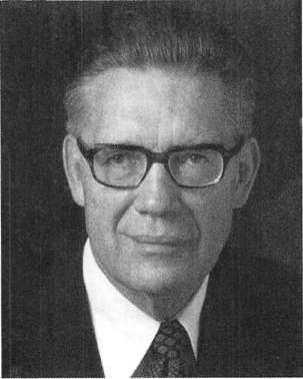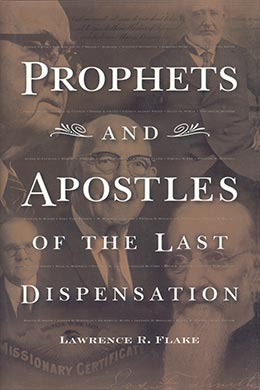Bruce Redd McConkie
Lawrence R. Flake, Prophets and Apostles of the Last Dispensation (Provo, UT: Religious Studies Center, Brigham Young University, 2001), 513–16.

Born: 29 July 1915, Ann Arbor, Michigan
First Council of the Seventy: 6 October 1946
Quorum of the Twelve Apostles: 12 October 1972 (age 57)
Died: 19 April 1985 (age 69), Salt Lake City, Utah
Released from his World War II duties as an intelligence and security officer at Fort Douglas, Utah, Bruce R. McConkie, though a practicing attorney before the war, decided to try his hand in the field of journalism. Having joined the Deseret News editorial staff, he was covering the semi-annual general conference of the Church. While seated at the press table a half hour before the beginning of the session, he was approached by President David O. McKay, then a counselor in the First Presidency, who informed him of his call to serve in the First Council of the Seventy. Absorbing this shocking news, he remained at the press table to cover the session and hear his name read for the sustaining vote of the entire Church.
Bruce R. McConkie, tall in stature and strong in testimony, was born to Oscar W. and Vivian Redd McConkie. The doctors had to work hard to save his mother’s life during childbirth. The infant, delivered with forceps and thought to be beyond saving, was set aside and almost forgotten. “After some appreciable period,” Brother McConkie related, “someone just happened to think there might be some life in the baby.” [1]
Another occasion found Elder McConkie very close to death. One day his father was quietly reading his newspaper in their farmhouse in Monticello, Utah, when the Spirit prompted him to run out to the orchard. Not knowing the reason, he raced out and saw a horse without a rider coming toward him at a dead run. After stopping the horse, he discovered his young son Bruce desperately clinging to the other side of the saddle, about to fall off and be dragged, his foot having slipped through the stirrup.
Elder McConkie’s noble father exerted a great influence in his son’s life. This good man, a great conversationalist, would continually engage his children in discussions on gospel subjects. Elder McConkie commented on the results: “He just kept me everlastingly thinking and evaluating on principles of the gospel, and the environment had the effect of getting my mind centered in those channels and the result, obviously, is that when I talk I’m talking on a doctrinal subject.” [2]
Born in Ann Arbor, Michigan, where his father was studying law, Elder McConkie returned with his family to Salt Lake City, where he attended Latter-day Saint High School and the University of Utah. In 1934 he served a mission in the eastern states, returning in 1936 to the University of Utah to complete his bachelor of arts degree and the following year to marry Amelia Smith, the daughter of Joseph Fielding Smith, a member of the Quorum of the Twelve. The McConkies became the parents of nine children. Their firstborn son, named for his father, died after only a few weeks. When the young couple was married, they decided to read the standard works together, “so we started the first day of our married life and continued without missing a day . . . until I was called to the First Council of the Seventy.” [3] His activities as a general authority were interrupted in 1961 while he served for three years as president of the South Australian Mission.
Throughout his ministry, Elder McConkie was much in demand as a speaker, teacher, and writer. He published an authoritative encyclopedia-like work, Mormon Doctrine, which contains information on over one thousand gospel subjects. His three-volume work, Doctrinal New Testament Commentary, his three-volume compilation of the teachings of Joseph Fielding Smith, Doctrines of Salvation, and his six volume work on the Messiah are invaluable additions to the literature of the Church. His colleague in the First Council of the Seventy for a quarter of a century, S. Dilworth Young, wrote of Elder McConkie’s literary talents: “His gift to write and speak concisely and with clarity amounts almost to genius, and he exercises these gifts willingly for the benefit of the work of the Lord whose name he reveres.” [4] Elder McConkie’s talent for writing was occasionally displayed in poetry and is lastingly preserved in the words he penned for a beloved Latter-day Saint hymn, “I Believe in Christ.”
In October 1972, Elder McConkie was called to fill the vacancy in the Quorum of the Twelve occasioned by the death of his own beloved father-in-law, President Joseph Fielding Smith, who had spent the last year of his life in the McConkie home.
Perhaps Elder McConkie’s most lasting contribution as a member of the Twelve resulted from his life of scripture study. For nearly a decade he served with other apostles and scholars in preparing the Latter-day Saint publication of the scriptures. He was the chief author of the chapter headings, which in some ways give a doctrinal interpretation of every chapter.
Elder Bruce R. McConkie’s death from cancer at age sixty-nine brought great sadness to the Church. His last public words, spoken in April general conference just two weeks before his death, contain one of the most powerful witnesses of the Savior ever borne: “I am one of his witnesses, and in a coming day I shall feel the nail marks in his hands and in his feet and shall wet his feet with my tears. But I shall not know any better then than I know now that he is God’s Almighty Son, that he is our Savior and Redeemer, and that salvation comes in and through his atoning blood and in no other way.” [5]
Notes
[1] Dell Van Orden, “Elder Bruce R. McConkie: ‘A Challenging Future’” Church News, 21 October 1972, 3.
[2] Van Orden, “‘Challening Future,’” 21.
[3] Van Orden, “‘Challening Future,’” 21.
[4] S. Dilworth Young, “Elder Bruce R. McConkie of the Council of the Twelve,” Ensign, January 1973, 10.
[5] Conference Report, April 1985, 12; see also “Elder Bruce R. McConkie, ‘Preacher of Righteousness,’” Ensign, June 1985, 15–21.
